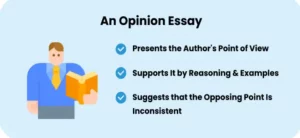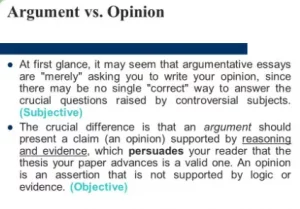Including opinions in an essay is at times difficult for students. This is because presenting opinions that are not general knowledge may require formal citations and the essay has to remain objective or unbiased.
In most cases, your opinion can be expressed as a sentence. This one sentence becomes your thesis statement,thus the center of focus in your essay.
Can an essay have personal opinion and how do you express personal views formally in an essay?
Can an Essay have Opinions?
The answer to this question is yes. Essays can have opinions. As noted, when writing a formal essay, you should be objective.
What this means is that you should avoid the usage of personal pronouns, express your attitudes through the use of feeling and thinking verbs, usage of attitudinal adjectives like spectacular, and emotive language or strong arguments.
When such features are included in your essay, it makes the essay informal. The essay will sound subjective and personal instead of presenting objective arguments concerning a certain topic or claim.
Through this is the case, there are times when you are required to present original or personal perspectives concerning a specific issue, theory, or event. Some instructors may deliberately ask you to present personal perspectives in your essay.
What this means is that the instructor wants to know your opinion and you must present it. Part of the essay instructions will present questions like: Do you agree or disagree? What do you think? Evaluate. Argue against or in favor of. Opinions that have been logically presented can also be found in hypotheses, interpretations of results, and evaluations.
So far, have you noticed that there is some contradiction here? On one hand, the essay is supposed to be objective.

On the other hand, it should contain a well-considered opinion that is based on research, analysis of the research, and critically thinking about the arguments and opinions.
In short, what you should note from the contradiction is that your opinions need to be presented in such a way that they appear objective.
Now that we have understood the need or use of opinions in an academic essay, you may be wondering where you can add them in your essay or where to expect them in other formal essays.
As aforementioned, opinions can be included when interpreting results, evaluating the results, or when writing hypotheses.
However, the location of opinions depends on the type of essay or genre. For example, opinions in academic essays for students can be located within the introduction and the conclusion.
The reason why they can appear within the introduction is that the student is introducing their topic and how they intend to present their arguments.
Furthermore, the thesis outlines the perspectives of the writer. Opinions can also be included within the conclusion because the student is allowed to reflect on the topic and present recommendations.
Difference Between an Opinion and an Argument in an Essay
There is a big difference between an opinion and an argument in an essay. However, how do you know the difference? Well, on one hand, an opinion is when a writer puts forth their perspective or point of view.
An opinion is generally a personal judgment or belief concerning a concept, theory, or subject matter that is not based on certainty or proof. It can be a vague idea that a writer has confidence in.

On the other hand, an argument is an assertion or fact given as evidence that something is factual.
Here, a discussion is provided in which valid reasons are advanced for or against a specific claim.
As such, an argument is balanced in a way that the writer gives the reader a valid alternative to how they perceive the claims in the essay.
In a nutshell, an opinion is a view or belief held by the writer while an argument is a logical and coherent set of reasons that are used to support an overall assessment or judgment in an essay.
How to Add Opinions in an Essay
As noted, opinions in academic essays can be located within the introduction and the conclusion. Furthermore, opinions can also be included within the. Just like writing compare and contrast essay, the structure and outline is similar.
Though this is the case, you have to add opinions using certain strategies. This not only signifies to your readers that you are about to express an opinion but also adds flow or continuity to your essay.
One method of adding opinions to an essay is to introduce them using informal English phrases.
While informal English phrases should not be used a lot when introducing an opinion because they make the essay too personal, they can be used when you wish to demonstrate to the reader the gravity of your opinion.
It means that you want your readers to know your perspective on the issue at hand.
The informal English phrases include “in my opinion”, “I believe that”, “in my mind”, “according to my perspective/point of view”, and so on.
For example, you can state: In my opinion, a college education should be the minimum requirement for anyone seeking an elective position.
You can also state: I believe that a college education should be the minimum requirement for anyone seeking an elective position. Such phrases can be used interchangeably.
You can also use formal phrases when adding opinions to an essay. They are more acceptable in academic writing because they sound objective and are straightforward.

They include “it would seem that”, “it could be argued that”, “this suggests that”, “this proves that”, “this supports the idea that”, and so on. You only need to add your opinion after the word “that”.
For example, an opinion would look like this: It could be argued that a college education should be the minimum requirement for anyone seeking an elective position.
It can also look like this: This suggests that a college education should be the minimum requirement for anyone seeking an elective position.
Another method of adding an opinion is to use the word “although” to demonstrate that you either agree with the claims or disagree with the claims. This is a very effective strategy because shows that you have considered every side of the argument.
Finally, the use of adjectives, adverbs, and nouns can help you add an opinion to an essay. They can include “poorly”, “highly”, “brilliant”, and so on.
How to Support your Opinion with References
If you have conducted proper research before writing your essay, there is a high probability that you will find a resource that will support or concur with your opinion. this leaves you with a well researched paper with no plagiarism.
Here, you will only need to create an in-text citation at the end of the sentence using your preferred academic format (APA, MLA, etc.), and then reference the resource on the last page of your essay.
Another strategy to support your opinion with references is to use the phrase “as (author) suggests…” This should be followed by the opinion.
For example, if a person called Maxwell King authored a book in the year 2020 that concurs with your opinion about politicians and college education, your opinion will look like this:
As King (2020) suggests in his book, college education should be the minimum requirement for anyone seeking an elective position.
How to Prevent the First-Person Language while Giving an Opinion
The first strategy is to avoid its use completely. First-person pronouns include “I”, “me”, “my”, “we”, and “us”. They make your essay wordy and less confident.
It is not a must to include a phrase like “I think that”. Consider the following sentences: I think that the character is highly motivated.
The character is highly motivated. The second sentence has eliminated personal pronouns while still maintaining the opinion (written in bold).
The second method is to use a different subject in place of personal pronouns. For example, I think that the character is highly motivated and can have a different subject and look like this: This paper argues that the character is highly motivated.

Joseph is a freelance journalist and a part-time writer with a particular interest in the gig economy. He writes about schooling, college life, and changing trends in education. When not writing, Joseph is hiking or playing chess.
